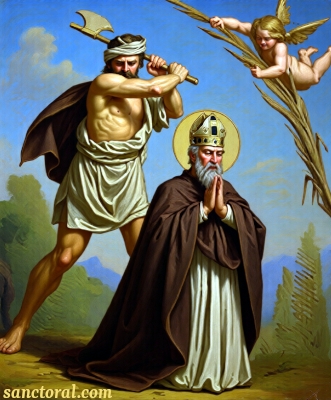Lives of the Saints
Our Models and Protectors
Spiritual Bouquet:
September 25

Saint Firmin
First Bishop of Amiens
and Martyr
(† Beginning of Second Century)
Saint Firmin, son of a senator, was a native of Pampeluna in Navarre. With his father he was taught the Christian faith by Honestus, a disciple of Saint Saturninus, the bishop of Toulouse, himself the disciple of Saint Peter the Apostle.
Saint Firmin, who had been confided by his father to Honestus for his education and had accompanied him on his apostolic journeys, was eventually consecrated bishop by Saint Honoratus, successor to Saint Saturninus at Toulouse. Firmin received the mission to preach the Gospel in the remoter parts of the Occident, or Gaul; thus he preached in the regions of Agen, Angers, and Beauvais. In what is now Clement-Ferrand, after long discussions with two ardent idolaters, he won them over. Error, wherever he passed, seemed to flee before him, as if the infernal powers feared to undertake a combat with this formidable adversary who was sure to defeat them.
He had not yet suffered persecution. Desiring martyrdom, he decided to go to a center of paganism in the north, in what is now Normandy, near Lisieux. There he was arrested and imprisoned for a time by the pagans. When delivered, he continued on towards the north, to a region where Saint Denys of Paris had baptized many. He confirmed the Christians in their faith, and went wherever a soul might have need of him. The Roman authorities heard of him and arrested him; the Saint generously confessed Jesus Christ in their presence. Again he was imprisoned, but released when the prefect and his successor both died suddenly. He was obliged, however, to flee secretly.
When he arrived at Amiens, he placed his residence there and founded a large church of faithful disciples. Amiens conserves the memory of the day he arrived and preached fearlessly there beside a temple of Jupiter, at a site where now the Basilica of Our Lady stands. He taught aloud the salutary doctrine of Christianity to all who came to listen. Many conversions followed, even among the authorities of the city, including the senator. He continued his preaching in that region for a number of years, while the pagan temples became literally deserted. And then two Roman officials, Longulus and Sebastian, heard of him and came to the city.
The pagan priests saw their opportunity, when all the city residents were convoked to appear before the visitors. The two officials explained that the capital penalty was decreed for those who did not obey the imperial edicts, not offering incense to the gods and honoring them. The pagan priests then told them of one who always refused to do so, and Saint Firmin, after an eloquent defense of the religion of Christ, was imprisoned. He finally saw his most ardent desire fulfilled when certain soldiers decided on their own to accomplish the imperial orders, and came with swords to his prison at night, where they decapitated the bishop. He died, filled with joy at their coming. This occurred under the reign of Trajan in the first years of the second century. The holy bishop remains in the greatest honor in the city of Amiens.
Les Petits Bollandistes: Vies des Saints, by Msgr. Paul Guérin (Bloud et Barral: Paris, 1882), Vol. 11